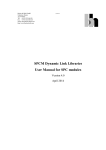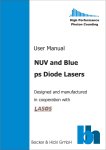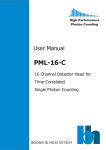Download PMM-328 32 Bit Dynamic Link Libraries User Manual
Transcript
Becker & Hickl GmbH Nahmitzer Damm 12277 Berlin Tel. +49 30 787 56 32 Fax. +49 30 787 57 34 email: [email protected] http://www.becker-hickl.de pmmdll32.doc PMM-328 32 Bit Dynamic Link Libraries User Manual Version 1.0, December 98 Introduction The PMM 32 bits Dynamic Link Library contains all functions to control the PMM-328 and PMA-328 modules. The functions work under Windows 95 and Windows NT. The program which calls the DLLs must be compiled with the compiler option 'Structure Alignment' set to '1 Byte'. The distribution disks contain the following files: PMMDLL32.DLL dynamic link library main file PMMDLL32.LIB import library file for Microsoft Visual C/C++, Borland C/C++, Watcom C/C++ and Symantec C/C++ compilers PMM_DEF.H Include file containing Types definitions, Functions Prototypes and Pre-processor statements PMM328.INI PMM DLL initialisation file PMMDLL32.DOC This description file USE_PMM.XXX Set of files to compile and run a simple example of using PMM DLL functions. The source file of the example is the file use_pmm.c. The example was originally prepared under Borland C/C++ v.4.52. For use in other compilers choose the correct import library file to link. There is no special installation procedure required. Simply execute the setup program from the 1st distribution diskette and follow its instructions. PMM-DLL Functions list The following functions are implemented in the PMM-DLL: Initialisation functions: PMM_init PMM_test_if_active PMM_get_init_status PMM_get_sync_adr PMM_set_sync_adr PMM_get_mode PMM_set_mode PMM_get_version Setup functions: PMM_get_parameter PMM_set_parameter PMM_get_parameters PMM_set_parameters PMM_get_eeprom_data PMM_write_eeprom_data PMM_get_adjust_parameters PMM_set_adjust_parameters Status functions: 2 PMM_test_if_busy PMM_read_status Measurement control functions: PMM_start_measure PMM_stop_measure PMM transfer functions: PMM_fill_memory PMM_read_data PMA_get_ADC_value (for PMA modules only) Test functions: PMM_test_id PMM_test_counter PMM_get_test_error_string Application Guide Initialisation of the PMM Measurement Parameters Before a measurement is started the measurement parameter values must be written into the internal structures of the DLL functions (not directly visible from the user program) and sent to the control registers of the PMM module. This is accomplished by the function PMM_init. The PMM DLL Functions can control up to four PMM modules. All modules can be synchronously started and stopped. The PMM_init function - reads the parameter values from a specified initialisation file - checks the sync_adr and base I/O addresses for all active modules to avoid hardware conflicts - checks and recalculates the parameters depending on the hardware restrictions and the adjust parameters from the EEPROM on each active PMM module - sends the parameter values to the PMM control registers on each active PMM module - performs a hardware test of each active PMM module The initialisation file is an ASCII file with a structure shown in the table below. Each module has its own section in the initialisation file ([pmm_module0..3]). Only modules which have an entry ‘ active = 1’ are initialised. We recommend either to use the file pmm328.ini or to start with pmm328.ini and to introduce the desired changes. ; ; ; ; PMM328 initialisation file PMM parameters have to be included in .ini file only when parameter value is different from default. module section (pmm_module0-3) is required for each existing PMM module [pmm_base] simulation = 0 base_sync_adr= 0x398 [pmm_module1] ; 0 - hardware mode(default) , ; >0 - simulation mode (see pmm_def.h for possible values) ; sync_adr will be set on all active modules to start/stop ; collection of photons (0 ... 0x3FC,default 0x398) ; PMM module 1 hardware parameters 3 base_adr = 0x380 active = 1 enable_meas = 1 trigger = 0 trig_level= 1.0 ;base I/O address (0 ... 0x3FC,default 0x380) ;module active - can be used (default = 0 - not active) ; enable/disable(1/0) measurement , default = enable ; external trigger condition ; none(0)(default),active low(1),active high(2) ;discriminator level for gate signal ; ( -0.2V ... +0.2V , default –0.2) ; trigger level for ( -1.0V ... +1.0V , default 1.0) inp_threshold_1= -0.1 inp_threshold_2= -0.1 inp_threshold_3= -0.1 inp_threshold_4= -0.1 inp_threshold_5= -0.1 inp_threshold_6= -0.1 inp_threshold_7= -0.1 inp_threshold_8= -0.1 ; all input thresholds have range -0.2 ... +0.2V and ;default value -0.1V ;input threshold level of channel 1 ;input threshold level of channel 2 ;input threshold level of channel 3 ;input threshold level of channel 4 ;input threshold level of channel 5 ;input threshold level of channel 6 ;input threshold level of channel 7 ;input threshold level of channel 8 gate_level= -0.2 collect_time= 1. start_ptr=0 end_ptr=0 ;collection time in seconds (default 1.0 sec) ; ( 0.25 mikrosec ... 100000 sec ) ; start point of collection( 0(default) ... 32767) ; end point of collection( start_ptr(default) ... 32767) [pmm_module1] ; PMM module 1 hardware parameters base_adr= 0x280 active= 0 ;base I/O address (0 ... 0x3FC) ;module not active - cannot be used [pmm_module2] ; PMM module 2 hardware parameters base_adr= 0x2a0 active= 0 ;base I/O address (0 ... 0x3FC) ;module not active - cannot be used [pmm_module3] ; PMM module 3 hardware parameters base_adr= 0x2c0 active = 0 ;base I/O address (0 ... 0x3FC) ;module not active - cannot be used After a PMM_init call we recommend to check which PMM modules are active by calling PMM_test_if_active function. At least one module must be active, and only active modules can be operated further. It is recommended (but not required) to check also the initialisation status (PMM_get_init_status) of each used module. In case of a wrong initialisation the initialisation status shows the reason of the error (see pmm_def.h for possible values ). In case of hardware test errors (values INIT_WRONG_COUNTER or INIT_WRONG_DACS) the function PMM_get_test_error_string returns additional information about the error. After calling the PMM_init function the measurement parameters from the initialisation file are present in the module control registers and in the internal data structures of the DLLs. To give the user access to the parameters, the function PMM_get_parameters is provided. This function transfers the parameter values from the internal structures of the DLLs into a structure of the type PMMdata (see pmm_def.h) which has to be defined by the user. The parameter values in this structure are described below. 4 short base_adr short init short active short test_eep short meas_mode short enable_meas short trigger float gate_level float inp_threshold[8] float collect_time unsigned short start_ptr unsigned short end_ptr unsigned short count[8]; I/O base address set to initialisation result code most of the library functions are executed only when module is active ( not 0 ) test EEPROM checksum on start-up or not measurement mode measurement enabled/disabled(1/0) external trigger condition none(0),active low(1),active high(2) gate discriminator level input threshold level of channels 1 - 8 collection time interval memory start pointer memory end pointer last value read from photon counter 1-8 To send the complete parameter set back to the DLLs and to the PMM module (e.g. after changing parameter values) the function PMM_set_parameters is used. This function checks and - if required - recalculates all parameter values due to cross dependencies and hardware restrictions. Therefore, it is recommended to read the parameter values after calling PMM_set_parameters by PMM_get_parameters. Single parameter values can be transferred to or from the DLL and module level by the functions PMM_set_parameter and PMM_get_parameter. To identify the desired parameter, the parameter identification par_id is used. The parameter identification keywords are defined in pmm_def.h. Memory Configuration The memory is organised in two banks which contain the data for 8 channels. The channel data are 16 bit counter values. The measurement memory length 32768 words for each counter channel. Memory Read/Write Functions Reading the memory of the PMM module is accomplished by the function PMM_read_data. To fill the memory with a constant value (or to clear the memory) the function PMM_fill_memory is available. Standard Measurements The most important measurement functions are listed below. The PMM_test_if_busy function is used to control the measurement loop. It sets a busy variable according to the current state of the measurement. The state of all active modules is taken into account in the return value: 0 - all active PMM modules have finished the measurement, 1 - the measurement is still running (at least) in one PMM module, no modules are waiting for an external trigger 2 - at least one module is waiting for the external trigger 5 The PMM_read_status function returns the current status of a particular PMM module. The most important status bits delivered by the function are listed below (see also PMM_DEF.H). ARMED MEASURE CT_EXP CT_OV OVFL_1 OVFL_2 OVFL_3 OVFL_4 OVFL_5 OVFL_6 OVFL_7 OVFL_8 0x1 0x2 0x40 0x80 0x100 0x200 0x400 0x800 0x1000 0x2000 0x4000 0x8000 module is armed module collects data ( Armed and Triggered ) collection timer expired (=0) collection timer overflow overflow on counter 1 overflow on counter 2 overflow on counter 3 overflow on counter 4 overflow on counter 5 overflow on counter 6 overflow on counter 7 overflow on counter 8 PMM_start_measure starts the measurement in all active PMM modules with the parameters set before by the PMM_init, PMM_set_parameters or PMM_set_parameter functions. The measurement starts to collect photons in subsequent points in PMM memory from the address START_PTR. The measurement stops when the memory pointer reaches END_PTR, i.e. after recording (End_ptr -Start_ptr + 1) points PMM_stop_measure is used to stop the measurement by a software command. In the figures below some block diagrams of some simple measurement routines are given. PMM_init change module parameters if required enable measurement: ENABLE_MEAS=1 set START_PTR set END_PTR PMM_start_measure PMM_test_if_busy 0 finished 1 still running 2 wait for trigger PMM_read_data PMM_read_status (check for possible overflow) Fig1: Multiscaler measurement without accumulation 6 PMM_init change module parameters if required enable measurement: ENABLE_MEAS=1 set START_PTR set END_PTR PMM_start_measure 0 finished PMM_test_if_busy 1 2 still running wait for trigger PMM_read_data Add sweep data to PC memory buffers last sweep ? No Yes PMM_read_status (check for possible overflow) ready Fig. 2: Multiscaler Measurement with software accumulation Error Handling Each PMM DLL function returns an error status. Return values >= 0 indicate error-fee execution. A value < 0 indicates that an error occurred during execution. The meaning of a particular error code can be found in pmm_def.h file. We recommend to check the return value after each function call. 7 Description of the PMM DLL Functions -------------------------------------------------------------------------------------------------------short CVICDECL PMM_init (char * ini_file); -------------------------------------------------------------------------------------------------------Input parameters: * ini_file: pointer to a string containing the name of the initialisation file in use (including file name and extension) Return value: 0 no errors, <0 error code Description: Before a measurement is started the measurement parameter values must be written into the internal structures of the DLL functions (not directly visible from the user program) and sent to the control registers of the PMM module. This is accomplished by the function PMM_init. The function - reads the parameter values from the specified file ini_file - checks sync_adr and base I/O addresses for all active modules to avoid hardware conflicts - checks and recalculates the parameters depending on hardware restrictions and adjust parameters from the EEPROM in each active PMM module - sends the parameter values to the PMM control registers of each active PMM module - performs a hardware test of each active PMM module The initialisation file is an ASCII file with a structure shown in the table below. We recommend either to use the file pmm328.ini or to start with pmm328.ini and introduce the desired changes. ; PMM328 initialisation file ; PMM parameters have to be included in .ini file only when parameter ; value is different from default. ; module section (pmm_module0-3) is required for each existing PMM module [pmm_base] simulation = 0 base_sync_adr= 0x398 [pmm_module1] base_adr = 0x380 active = 1 enable_meas= 1 trigger = 0 gate_level= -0.2 trig_level= 1.0 ; 0 - hardware mode(default) , ; >0 - simulation mode (see pmm_def.h for possible values) ; sync_adr will be set on all active modules to start/stop ; collection of photons (0 ... 0x3FC,default 0x398) ; PMM module 1 hardware parameters ;base I/O address (0 ... 0x3FC,default 0x380) ;module active - can be used (default = 0 - not active) ; enable/disable(1/0) measurement , default = enable ; external trigger condition ; none(0)(default),active low(1),active high(2) ;discriminator level for gate signal ; ( -0.2V ... +0.2V , default –0.2) ; trigger level for ( -1.0V ... +1.0V , default 1.0) ; all input thresholds have range -0.2 ... +0.2V and 8 inp_threshold_1= -0.1 inp_threshold_2= -0.1 inp_threshold_3= -0.1 inp_threshold_4= -0.1 inp_threshold_5= -0.1 inp_threshold_6= -0.1 inp_threshold_7= -0.1 inp_threshold_8= -0.1 collect_time= 1. ;default value -0.1V ;input threshold level of channel 1 ;input threshold level of channel 2 ;input threshold level of channel 3 ;input threshold level of channel 4 ;input threshold level of channel 5 ;input threshold level of channel 6 ;input threshold level of channel 7 ;input threshold level of channel 8 start_ptr=0 end_ptr=0 ;collection time in seconds (default 1.0 sec) ; ( 0.25 mikrosec ... 100000 sec ) ; start point of collection( 0(default) ... 32767) ; end point of collection( start_ptr(default) ... 32767) [pmm_module1] ; PMM module 1 hardware parameters base_adr= 0x280 active = 0 ;base I/O address (0 ... 0x3FC) ;module not active - cannot be used [pmm_module2] ; PMM module 2 hardware parameters base_adr= 0x2a0 active = 0 ;base I/O address (0 ... 0x3FC) ;module not active - cannot be used [pmm_module3] ; PMM module 3 hardware parameters base_adr= 0x2c0 active = 0 ;base I/O address (0 ... 0x3FC) ;module not active - cannot be used After a PMM_init call we recommend to check which PMM modules are active by calling PMM_test_if_active function (minimum one module must be active and only active modules can be operated further). It is reasonable also to check the initialisation status (PMM_get_init_status) of each used module. The initialisation status can show the reason of a wrong initialisation (see pmm_def.h for possible values ). In case of hardware test errors (values INIT_WRONG_COUNTER or INIT_WRONG_DACS) the function PMM_get_test_error_string delivers additional information. -------------------------------------------------------------------------------------------------------short CVICDECL PMM_test_if_active (short mod_no); -------------------------------------------------------------------------------------------------------Input parameters: mod_no module number (0 - 3) Return value: 0 - module mod_no not active ( cannot be used) , 1 - module mod_no active 9 Description: The procedure returns information whether the module specified by ‘mod_no’ is active or not. A module is set active only if there is the entry ‘active = 1’ in the respective module section in the ini_file. As a result of a wrong initialisation (PMM_init function) a module can be deactivated. In this case a the PMM_get_init_status function can explain the reason of deactivating the module. -------------------------------------------------------------------------------------------------------short CVICDECL PMM_get_init_status(short mod_no,short * ini_status); -------------------------------------------------------------------------------------------------------Input parameters: mod_no *ini_status Return value: module number (0 - 3) pointer to the initialisation status 0 no errors, <0 error code (see pmm_def.h) Description: The procedure loads the ini_status variable with the initialisation result code set by the function PMM_init for module ‘mod_no’. The possible values are shown below (see also pmm_def.h): INIT_OK INIT_NOT_DONE INIT_WRONG_EEP_CHKSUM INIT_WRONG_MOD_ID INIT_WRONG_BASE_ADR INIT_WRONG_SYNC_ADR INIT_WRONG_COUNTER INIT_WRONG_DACS 0 -1 -2 -3 -4 -5 -6 -7 no error initialisation not done wrong EEPROM checksum wrong module identification code not unique base address sync address equal to base address counter test failed DAC’s test failed In case of hardware test errors (values INIT_WRONG_COUNTER or INIT_WRONG_DACS) the function PMM_get_test_error_string gives additional information on the test error. -------------------------------------------------------------------------------------------------------short CVICDECL PMM_get_sync_adr(short * adr); -------------------------------------------------------------------------------------------------------Input parameters: *adr Return value: pointer to the sync address 0 no errors, <0 error code (see pmm_def.h) Description: The procedure loads the ‘adr’ variable with the actual sync address value. 10 The Sync address is common for all active modules and is used to synchronously start and stop all modules. The procedure returns an error, if the sync address has not the same value for all modules. -------------------------------------------------------------------------------------------------------short CVICDECL PMM_set_sync_adr(short adr); -------------------------------------------------------------------------------------------------------Input parameters: mod_no adr Return value: module number (0 - 3) new value of sync address 0 no errors, <0 error code (see pmm_def.h) Description: The procedure sets the sync address value to ‘adr’. The Sync address is common for all active modules and is used to synchronously start/stop all modules. The procedure checks for conflicts with I/O addresses used by the active PMM modules and, - if there are no conflicts- changes the sync address. The procedure should be used only if the actual sync address (set during the initialisation to a value taken from ini_file) causes conflicts with other devices. -------------------------------------------------------------------------------------------------------short CVICDECL PMM_get_mode(void); -------------------------------------------------------------------------------------------------------Input parameters: none Return value: current mode of DLL operation Description: The procedure returns the current mode of DLL operation (hardware or simulation). Possible ‘mode’ values are defined in the pmm_def.h file: #define PMM_HARD #define PMM_SIMUL328 #define PMA_SIMUL328 0 30 40 /* hardware mode */ /* simulation mode of PMM328 */ /* simulation mode of PMA328 */ 11 -------------------------------------------------------------------------------------------------------short CVICDECL PMM_set_mode(short mode); -------------------------------------------------------------------------------------------------------Input parameters: mode: mode of DLL operation Return value: 0 no errors, <0 error code (see pmm_def.h) Description: The procedure is used to change the mode of the DLL operation between the hardware mode and the simulation mode. It is a low level procedure and not intended to normal use. It is used to switch the DLL to the simulation mode if hardware errors occur during the initialisation. Use the function PMM_get_mode to check which mode is actually set. Possible ‘mode’ values are defined in the pmm_def.h file. -------------------------------------------------------------------------------------------------------short CVICDECL PMM_get_version(short mod_no , short * version); -------------------------------------------------------------------------------------------------------Input parameters: mod_no *version Return value: module number (0 - 3) pointer to the version variable 0 no errors, <0 error code (see pmm_def.h) Description: The procedure loads the ‘version’ variable with the FPGA version of the module specified by mod_no. This is low a level procedure, not needed normally. -------------------------------------------------------------------------------------------------------short CVICDECL PMM_get_parameters(short mod_no, PMMdata * data); -------------------------------------------------------------------------------------------------------Input parameters: mod_no *data Return value: module number (0 - 3) pointer to result structure (type PMMdata) 0 no errors, <0 error code (see pmm_def.h) Description: After calling the PMM_init function (see above) the measurement parameters from the initialisation file are present in the module and in the internal data structures of the DLLs. To give the user access to the parameters, the function PMM_get_parameters is provided. This function transfers the parameter values of the module ‘mod_no’ from the internal structures 12 of the DLL into a structure of the type PMMdata (see pmm_def.h) which has to be defined by the user. The parameter values in this structure are described below. short base_adr short init short active short test_eep short meas_mode short enable_meas short trigger float gate_level float inp_threshold[8] float collect_time unsigned short start_ptr unsigned short end_ptr unsigned short count[8]; I/O base address set to initialisation result code most of the library functions are executed only when module is active ( not 0 ) test EEPROM checksum on start-up or not measurement mode measurement enabled/disabled(1/0) external trigger condition none(0),active low(1),active high(2) gate discriminator level input threshold level of channels 1 - 8 collection time interval memory start pointer memory end pointer last value read from photon counter 1-8 -------------------------------------------------------------------------------------------------------short CVICDECL PMM_set_parameters(short mod_no, PMMdata * data); -------------------------------------------------------------------------------------------------------Input parameters: mod_no *data Return value: module number (0 - 3) pointer to parameters structure (type PMMdata, see pmm_def.h) 0 no errors, <0 error code (see pmm_def.h) Description: The procedure sends all parameters from the ‘PMMdata’ structure to the internal DLL structures and to the control registers of the PMM module ‘mod_no’. The new parameter values are recalculated according to the parameter limits and hardware restrictions (e.g. DAC resolution). Furthermore, cross dependencies between different parameters are taken into account to ensure the correct hardware operation. It is recommended to read back the parameters after setting to get their real values after recalculation. The values of ‘base_adr’, ‘init’ and ‘active’ are not changed. They can be changed only by a new ini_file an a PMM_init call. If an error occurs at a particular parameter, the procedure does not set the rest of the parameters and returns with an error code. 13 -------------------------------------------------------------------------------------------------------short CVICDECL PMM_get_parameter(short mod_no, short par_id, float * value); -------------------------------------------------------------------------------------------------------Input parameters: mod_no par_id *value Return value: module number (0 - 3) parameter identification number (see pmm_def.h) pointer to the parameter value 0 no errors, <0 error code (see pmm_def.h) The procedure loads ‘value’ with the actual value of the requested parameter from the DLLinternal data structures of the module ‘mod_no’. The par_id values are defined in pmm_def.h file as PMM_PARAMETERS_KEYWORDS. -------------------------------------------------------------------------------------------------------short CVICDECL PMM_set_parameter(short mod_no, short par_id, float value); -------------------------------------------------------------------------------------------------------Input parameters: mod_no par_id value module number (0 - 3) parameter identification number new parameter value Return value: 0 no errors, <0 error code (see pmm_def.h) The procedure sets the specified hardware parameter. The value of the specified parameter is transferred to the internal data structures of the DLL functions and to the PMM module ‘mod_no’. The new parameter value is recalculated according to the parameter limits and hardware restrictions (e.g. DAC resolution). Furthermore, cross dependencies between different parameters are taken into account to ensure the correct hardware operation. It is recommended to read back the parameters after setting to get their real values after recalculation. The parameters BASE_ADR and ACTIVE cannot be changed. They can be changed only by a new ini_file and a PMM_init call. The par_id values are defined in pmm_def.h file as PMM_PARAMETERS_KEYWORDS. 14 -------------------------------------------------------------------------------------------------------short CVICDECL PMM_get_eeprom_data(short mod_no, PMM_EEP_Data *eep_data); -------------------------------------------------------------------------------------------------------Input parameters: mod_no *eep_data Return value: module number (0 - 3) pointer to result structure 0 no errors, <0 error code (see pmm_def.h) The structure "eep_data" is filled with the contents of the EEPROM of the PMM module specified by ‘mod_no’. The EEPROM contains production data and adjust parameters of the module. The structure "PMM_EEP_Data" is defined in the file pmm_def.h. Normally, the EEPROM data need not be read explicitly because the EEPROM is read during PMM_init and the module type information and the adjust values are taken into account when the PMM module registers are loaded. -------------------------------------------------------------------------------------------------------short CVICDECL PMM_write_eeprom_data(short mod_no, unsigned short write_enable, PMM_EEP_Data *eep_data); -------------------------------------------------------------------------------------------------------Input parameters: mod_no write_enable *eep_data Return value: module number (0 - 3) write enable password pointer to result structure 0 no errors, <0 error code (see pmm_def.h) The function is used to write data to the EEPROM of an PMM module ‘mod_no’ by the manufacturer. To prevent corruption of the adjust data by not allowed access the function writes data to the EEPROM only if the ‘write_enable’ password is correct. -------------------------------------------------------------------------------------------------------short CVICDECL PMM_get_adjust_parameters (short mod_no, PMM_Adjust_Para * adjpara); -------------------------------------------------------------------------------------------------------Input parameters: mod_no * adjpara Return value: module number (0 - 3) pointer to result structure 0 no errors, <0 error code (see pmm_def.h) 15 The structure 'adjpara' is filled with adjust parameters that are currently in use. The parameters can either be previously loaded from the EEPROM by PMM_init or PMM_get_eeprom_data or - not recommended - set by PMM_set_adust_parameters. The structure "PMM_Adjust_Para" is defined in the file pmm_def.h. Normally, the adjust parameters need not be read explicitly because the EEPROM is read during PMM_init and the adjust values are taken into account when the PMM module registers are loaded. -------------------------------------------------------------------------------------------------------short CVICDECL PMM_set_adjust_parameters (short mod_no, PMM_Adjust_Para * adjpara); -------------------------------------------------------------------------------------------------------Input parameters: mod_no * adjpara Return value: module number (0 - 3) pointer to result structure 0 no errors, <0 error code (see pmm_def.h) The adjust parameters in the internal DLL structures (not in the EEPROM) are set to values from the structure "adjpara". The function is used to set the module adjust parameters to values other than the values from the EEPROM. The new adjust values will be used until the next call of PMM_init. The next call to PMM_init replaces the adjust parameters by the values from the EEPROM. We strongly discourage to use modified adjust parameters, because the module function can be seriously corrupted. The structure "PMM_Adjust_Para" is defined in the file pmm_def.h. -------------------------------------------------------------------------------------------------------short CVICDECL PMM_test_if_busy(short * busy); -------------------------------------------------------------------------------------------------------Input parameters: *busy Return value: pointer to result value 0 no errors, <0 error code (see pmm_def.h) PMM_test_if_busy sets a busy variable according to the current state of the measurement. The function is used to control the measurement loop after starting the measurement. The current state of all active modules is taken into account. Possible values of busy are listed below. 0 - all active PMM modules finished the measurement, 1 - the measurement is still running at least in one PMM module, no modules are waiting for the trigger 2 - at least one module is waiting for the trigger 16 -------------------------------------------------------------------------------------------------------short CVICDECL PMM_read_status(short mod_no, unsigned short * status); -------------------------------------------------------------------------------------------------------Input parameters: mod_no *status Return value: module number (0 - 3) pointer to result value 0 no errors, <0 error code (see pmm_def.h) The PMM_read_status function returns the current status of PMM module ‘mod_no’. The most important status bits delivered by the function are listed below (see also PMM_DEF.H). ARMED MEASURE CT_EXP CT_OV OVFL_1 OVFL_2 OVFL_3 OVFL_4 OVFL_5 OVFL_6 OVFL_7 OVFL_8 0x1 0x2 0x40 0x80 0x100 0x200 0x400 0x800 0x1000 0x2000 0x4000 0x8000 module is armed module collects data ( Armed and Triggered ) collection timer expired (=0) collection timer overflow overflow in counter 1 overflow in counter 2 overflow in counter 3 overflow in counter 4 overflow in counter 5 overflow in counter 6 overflow in counter 7 overflow in counter 8 The function is a low level procedure which is normally used only to test whether an overflow occurred during the measurement and to get additional information about the PMM module state. To control the measurement, the PMM_test_if_busy function is recommended. -------------------------------------------------------------------------------------------------------short CVICDECL PMM_start_measure(void); -------------------------------------------------------------------------------------------------------Input parameters: none Return value: 0 no errors, <0 error code (see pmm_def.h) The procedure is used to start the measurement. Before a measurement is started by PMM_start_measure - the parameters on all active modules must be set (PMM_init or PMM_set_parameter(s) ) - the measurement must be enabled in all requested modules (parameter ENABLE_MEAS must be set by PMM_set_parameter), - START_PTR and END_PTR must be set to define the number of points to be measured. The measurement stops the when the memory pointer reaches END_PTR, i.e. after collecting End_ptr -Start_ptr + 1 points. 17 -------------------------------------------------------------------------------------------------------short CVICDECL PMM_stop_measure(void); -------------------------------------------------------------------------------------------------------Input parameters: none Return value: 0 no errors, <0 error code (see pmm_def.h) PMM_stop_measure is used to stop the measurement by a software command. -------------------------------------------------------------------------------------------------------short CVICDECL PMM_fill_memory(short mod_no, short channel, unsigned short from, unsigned short to, unsigned long fill_value); -------------------------------------------------------------------------------------------------------Input parameters: mod_no channel from to fill_value Return value: module number (0 - 3) channel number 0 - 7 , all channels: -1 1st address to fill (0 to 32767 ) last address to fill ( ‘from’ to 32767) value written into the PMM memory 0 no errors, <0 error code (see pmm_def.h) The procedure is used to fill a specified part of the memory of the PMM module ‘mod_no’ with the value ‘fill_value’. -------------------------------------------------------------------------------------------------------short CVICDECL PMM_read_data(short mod_no, short channel, unsigned short from, unsigned short to, unsigned short * buf, unsigned short * points_read); -------------------------------------------------------------------------------------------------------Input parameters: mod_no channel from to * buf * points_read Return value: module number (0 - 3) channel number (0 - 7) 1st address to read (0 to 32767) last address to read ( ‘from’ to 32767) pointer to a data buffer to be filled with channel data pointer to a variable which will be set with number of read points 0 no errors, <0 error code (see pmm_def.h) The procedure is used to read measurement results from the channel number ‘channel’ on PMM module ‘mod_no’. The number of points read (16 bit counter values) depends on the state of the measurement. 18 If the measurement is already finished (or not started yet), the procedure reads the PMM memory from the address ‘from’ to the address ‘to’ and sets the points_read variable to the value ‘ to - from +1’. If the measurement is still running, the procedure reads the PMM memory from the address ‘from’ up to the current memory pointer. Then it reads the last (not finished) point value directly from the counter. Finally, the procedure sets the ‘points_read’ variable to a value equal to the number of points collected from the start of the measurement. Please make sure that the buffer ‘buf’ is allocated with enough memory for the required number of points (to - from +1). -------------------------------------------------------------------------------------------------------short CVICDECL PMA_get_ADC_value (short mod_no, short chan_no, unsigned short * value); -------------------------------------------------------------------------------------------------------Input parameters: mod_no chan_no * value Return value: module number (0 - 3) ADC channel number (0 - 31) pointer to a variable which to be set with ADC value 0 no errors, <0 error code (see pmm_def.h) The procedure is intended for use with PMA modules only (a version of the PMM-328 with an additional 32 channel multiplexed ADC). It sets the input multiplexer to the desired input channel (chan_no, 0..31), waits until the multiplexer output has settled, starts the AD conversion and reads the result from the ADC. The range of the result is -8192 to +8191 for all input voltage ranges. The procedure fills the ‘value’ variable with the value read from the ADC connected to the input channel ‘chan_no’ on the PMA module ‘mod_no’. -------------------------------------------------------------------------------------------------------short CVICDECL PMM_test_id(short mod_no) ; -------------------------------------------------------------------------------------------------------Input parameters: mod_no: module number (0 - 3) Return value: on success - module type, on error <0 (error code) The procedure is used to check the identification code of PMM module ‘mod_no’. It is a low level procedure that is called also during the initialisation in PMM_init. The procedure returns a module type value, if the id is correct. Possible module type values are defined in the pmm_def.h file. 19 -------------------------------------------------------------------------------------------------------short CVICDECL PMM_test_counter(short mod_no, short *active); -------------------------------------------------------------------------------------------------------Input parameters: mod_no * active Return value: module number (0 - 3) pointer to gate polarity variable 0 no errors, <0 error code (see pmm_def.h) The procedure performs a trigger test and counter test in the PMM module ‘mod_no’ and determines the state of the gate polarity jumpers. Possible values of the ‘active’ variable after the test is listed below: -1 - hardware error detected, gate polarity unknown 0 - test OK, gate polarity active high, 1 - test OK, gate polarity active low, 2 - hardware error detected. Probably jumper missing, check the module and insert the missing jumper In case of a return value < 0 the function PMM_get_test_error_string can get additional information on test error. The error string is prepared during the test execution. Important: The input signals must be disconnected from the module inputs during the test. -------------------------------------------------------------------------------------------------------short CVICDECL PMM_get_test_error_string(char *error_string); -------------------------------------------------------------------------------------------------------Input parameters: error_string pointer to error message string Return value: <0 last error code (see pmm_def.h) The procedure fills ‘error_string’ with the internal DLL string generated during the last execution of the PMM_test_counter or PMM_init function. ‘Error string’ contains detailed information on a counter test error or a DAC test error (during PMM_init). After a call to PMM_get_test_error_string DLL’s internal error string is empty. ================================================================ 20 21




































